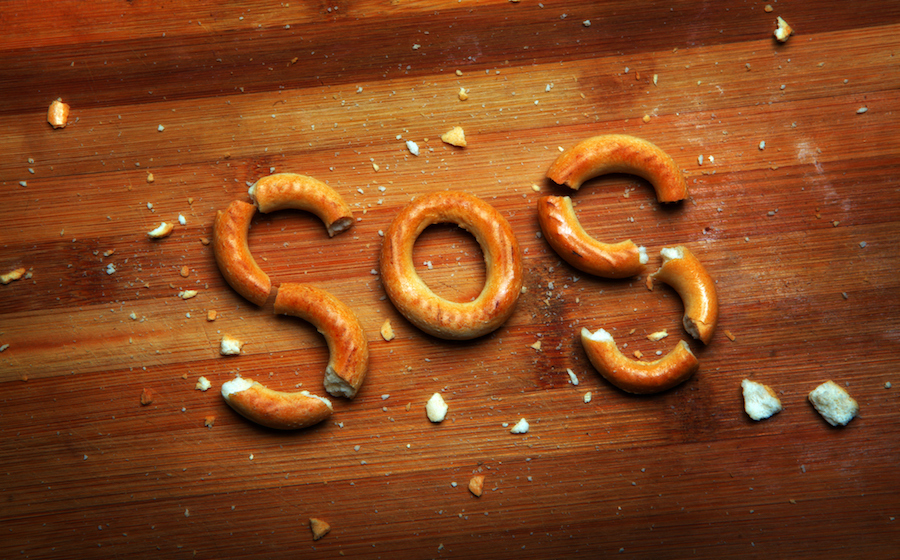Would you know the signs of coeliac disease?
It is Coeliac Awareness Week and for many people, avoiding gluten isn’t just a lifestyle choice or a means of avoiding bloating, but a serious health matter.
Around 1 in 100 people in the UK are thought to be affected by coeliac disease, which causes painful and troublesome symptoms as well as potentially serious damage to the small intestines as a result of consuming even the smallest amount of gluten.
And research suggests that around 500,000 people are living with the condition but yet to be diagnosed. Because the symptoms can overlap with other more common conditions, such as IBS and food intolerance/sensitivity, it can take a long time for coeliac disease to be accurately confirmed – in fact, recent figures suggest the average length of time taken for someone to be diagnosed from the onset of symptoms is currently a staggering 13 years.
Here, Will Hawkins, a nutritionist speaking on behalf of Push Doctor, explains more about coeliac disease, spotting the symptoms, and how the condition is managed…

Going gluten-free has never been trendier
What is coeliac disease?
While going gluten-free is a choice for some people, for people with coeliac disease, it’s an absolute medical necessity.
Different from an allergy or intolerance, coeliac is classified as an autoimmune disease, which means the immune system accidentally mistakes an innocent substance for a threat and attacks healthy cells. “In this case, the innocent substance is gluten,” says Hawkins, “which is found in any food (or drink) that contains barley, wheat or rye.”

Eating wheat products like bread can cause painful symptoms for people with coeliac disease
This internal reaction causes inflammation and damage to the surface of the small intestines, rendering it unable to absorb essential nutrients from food. It’s not entirely clear what causes the immune system to act in this way, but scientists believe it could be down to a combination of genetic and environment factors. Autoimmune conditions can also sometimes, though not always, run in families: studies show that for coeliac disease, if you have a close relative who has it, there’s a one in 10 chance you’ll develop it too.
What are the symptoms?
It might sound unpleasant, but your stools might be the first warning sign. “As with a lot of digestive problems, the answer often lies in what you see in the toilet,” says Hawkins. “Diarrhoea is the most common symptom of coeliac disease, while your poo may also be very greasy and smelly due to your body being unable to properly absorb the fat in your diet.”

Bloating and stomach pains are among the symptoms
Aside from unpleasant toilet trips, there are other painful symptoms that could give you a clue. “You might also feel bloated, have a bad stomach ache, suffer from indigestion or feel nauseous,” says Hawkins, “particularly after eating foods containing gluten.”
When people aren’t absorbing food properly, there can also be knock-on complications caused by a lack of certain vitamins and minerals, including sudden and unexplained weight loss, low energy and fatigue, and conditions such as anaemia and osteoporosis.
How can you find out if you have it?
If you think you might be experiencing symptoms of coeliac, the best thing to do is to speak to your GP. Remember, the symptoms could also be down to more common causes like IBS, but self-diagnosing is best avoided, as you could be missing out on the chance to get an accurate diagnosis and important advice on managing your symptoms.
While routine testing for coeliac disease isn’t carried out on the NHS, after talking to you about your symptoms and medical history, and possibly examining you, there are tests your doctor can refer you for if they suspect you might have coeliac disease, or another bowl problem that needs to be investigated. Blood tests can sometimes detect certain antibodies that are present in people with coeliac disease.

Your doctor can test your blood for signs of coeliac disease
“You might be given a blood test to look for antibodies, or a biopsy to analyse your intestines,” says Hawkins, who stresses that you shouldn’t make any rash changes to your diet during this time. “In order to get accurate results, it’s really important that you continue to eat gluten products as you were before, in order for the doctor get accurate results from your tests. You should only stop eating gluten once you’ve been diagnosed.”
How can it be treated?
There’s no cure for coeliac disease, but the condition can be managed with a strict gluten-free diet. This isn’t just important for avoiding painful and distressing flare-ups, but to safeguard against long-term intestinal damage.
“The most effective treatment for coeliac disease is to simply stop consuming products that contain gluten,” says Hawkins. This might sound overwhelming, but Coeliak UK (Coeliac.org.uk) have a checklist of foods you should avoid, as well as tips and advice for anyone making the change.
Obvious sources of gluten include breads, pasta, cereals, cakes and biscuits, but gluten can also found in many common food items, such as fish fingers, sausages, gravies, sauces, stock cubes, soy sauce and even in some brands of chocolate.
If you’re unsure, Coeliac UK also has a free app called ‘Gluten Free Food Checker’ that can be really helpful when you’re out shopping in the supermarket – all you have to do is scan the barcode of a product and the app will tell you whether or not it’s suitable for you to eat.
“Make sure you check the ingredients on any food or drink you buy,” adds Hawkins, “and if you’re eating at a restaurant, make sure the staff know about your condition so that they can recommend foods that won’t cause your symptoms to flare up.”
As an extra tip, Hawkins says you should look to incorporate more prebiotics and probiotics into your diet, through green leafy veg and dairy products, as these help to promote good gut health.
If you’re worried about the impact coeliac will have on your lifestyle, your doctor can also refer you to a specialist dietitian for support and practical advice to help you manage the condition day-to-day.
Of course, omitting gluten from your diet isn’t easy, but it’s important for your health to try to avoid it completely, as even small amount of gluten can damage your intestine. Thankfully, many supermarkets now offer gluten-free products, while restaurants are slowly beginning to adopt ‘GF’ annotations on menus, to let coeliacs know which foods are suitable for them.
“If in doubt, make sure to ask,” says Hawkins. “It’s safer to enquire than eating something that could lead to days of discomfort.”
Do you suffer from coeliac disease?
The Press Association
Latest posts by The Press Association (see all)
- 3 recipes to make from the new Hairy Bikers cookbook - April 26, 2024
- World Penguin Day: Test your knowledge with our penguin-themed quiz - April 23, 2024
- Kate’s new photo of Louis released to celebrate prince’s sixth birthday - April 23, 2024
- Alan Titchmarsh: Slugs are never going to be my friends - April 23, 2024
- Prince Louis celebrates sixth birthday - April 23, 2024






















